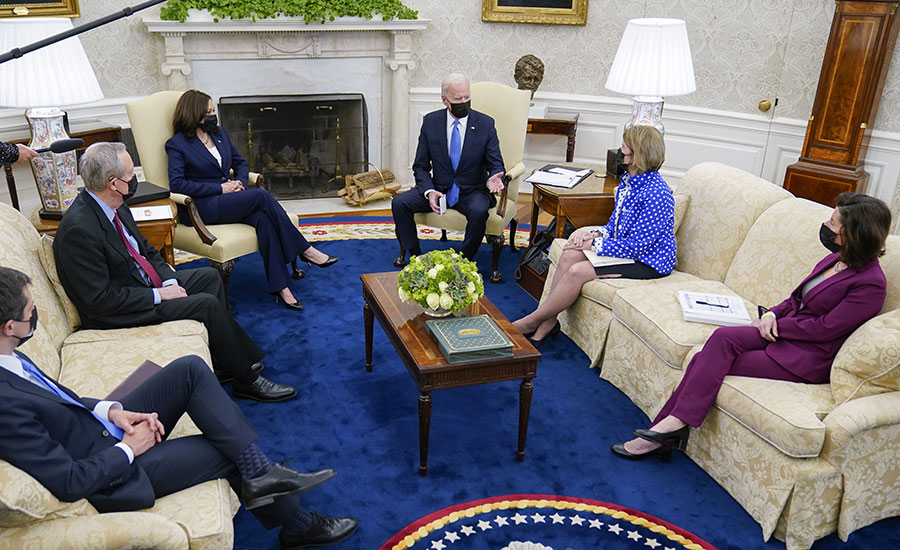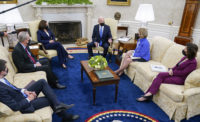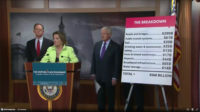Discussions between President Joe Biden and key Senate Republicans about infrastructure legislation are expected to continue this week, with the goal of narrowing the wide gap between initial proposals from each side.
The proposed legislative frameworks are far apart. Biden on March 31 unveiled a $2.3-trillion American Jobs Plan Act, which includes $1 trillion for core infrastructure programs, ENR estimates. Funding generally would be spread over eight years.
But the American Jobs Plan also includes substantial funding for other programs, such as home health care, that constitute a more expansive definition of infrastructure.
Senate Republicans on April 22 countered with a $568-billion five-year proposal, limiting spending to fewer infrastructure categories, such as transportation, water and broadband.
Biden held meetings in the Oval Office on May 12, with congressional leaders from both parties, and on May 13, with top Republicans on key infrastructure committees. The next step is a revised offer from the Republicans, which could be released within days.
After the May 13 meeting, which included top GOP Senators on committees that oversee infrastructure-related sectors, Biden said, “I laid out what I thought we should be doing, and how it should be paid for.”
According to Biden, Republican senators “said they'll come back to me with a counteroffer of what they are prepared to do and fund, and how to fund it, and then we'll talk again next week.”
Sen. Shelley Moore Capito (R-W.Va.), who has been the Senate GOP point person on infrastructure, told reporters after the May 13 session, “We had a very productive, more-than-courteous give and take."
Capito, ranking Republican on the Environment and Public Works Committee, added, “We did talk specifics. And the president has asked us to come back and rework an offer so that he can then react to that and then re-offer to us.”
She said, "We’re very encouraged," adding Biden was "very much desirous of striking a deal."
Key unresolved issues include what infrastructure sectors should be covered, an overall price tag for the measure and—perhaps toughest of all—what revenue sources to tap to pay for the package.
Biden has proposed funding his plan by partially rolling back the 2017 Tax Cuts and Jobs Act's reduction in the corporate tax rate.
Red Lines on the 'Pay-Fors'
But Republicans see that as a nonstarter. After the May 12 meeting with Biden, Senate Minority Leader Mitch McConnell (R-Ky.) told reporters, "We're not interested in reopening the 2017 tax bill."
McConnell said both he and House Minority Leader Kevin McCarthy (R-Calif.) "made that clear to the president." McConnell added, "That's our red line."
There has been talk of drawing on user fees to finance the package. The current federal user fee that brings in the most revenue is the 18.4¢ per gallon gasoline tax.
Biden has pledged not to raise taxes on those earning less than $400,000 a year. "That is still a red line," White House Press Secretary Jen Psaki said in her May 14 briefing. Psaki added, "User fees that have been proposed out there would violate that."
Bipartisan Approach or Democrats-Only?
Observers are watching closely to see whether a bipartisan agreement will be reached. Meanwhile, work is proceeding in the House Transportation and Infrastructure, and Senate Environment and Public Works committees on a new bill to reauthorize federal highway and transit programs, either as a stand-alone measure or part of a bigger package.
Anthony Foxx, Transportation Secretary in the last four years of the Obama administration, said, "if there are large portions of the American Jobs Plan that get bipartisan support, I can easily see the administration agreeing to have those portions move forwards in a bipartisan fashion."
Foxx, speaking on a Zoom call May 14 with reporters and Obama DOT alumni, added, "The administration always has the opportunity to proceed in a more muscular fashion with Democrats going it alone. And perhaps that is what will happen with the remaining parts."
Foxx was referring to Democrats' ability to use the budget reconciliation mechanism to allow for Senate passage with a bare majority.
“I could see [the White House] sort of breaking up some pieces of the large package into bite size-chunks—some of which would pass with bipartisan support, some of which may not," he said.
Jimmy Christianson, Associated General Contractors of America vice president for government relations, said in an interview, "I think that the fact that you see this much interest in negotiation [on the part of] the White House is a sign that there may not be a unanimous 50-senator vote avenue at this moment for passing an infrastructure bill through reconciliation. So perhaps this is a way of finding a bipartisan path forward."
He said pursuing a bipartisan approach would require "reaching to the middle instead of the far extremes is the only viable path forward" to produce a measure with substantial increases over current infrastructure funding levels.
Christianson said that would be "a better outcome for the construction industry more broadly than something that’s written by one party."
Highway-Transit Bill
Meanwhile, work is proceeding in the House Transportation and Infrastructure and Senate Environment and Public Works committees on a new bill to reauthorize federal highway and transit programs, either as a stand-alone measure or as part of a bigger package.
Sean O’Neill, Portland Cement Association senior vice president for government affairs, said in an interview the White House-GOP infrastructure discussions and the progress on a highway-transit bill in Congress are signs of progress. "It offers encouragement that action on infrastructure [legislation] can be achieved at some point this summer.”
He said the scope and total funding levels that might emerge from the Biden-GOP talks aren't clear, "but the willingness of both sides ... to negotiate is encouraging."
According to Christianson, Senate and House committee leaders have said they want to see their panels approve their respective surface transportation bills by Memorial Day. But he added, “We see that deadline slipping some, into June."






Post a comment to this article
Report Abusive Comment